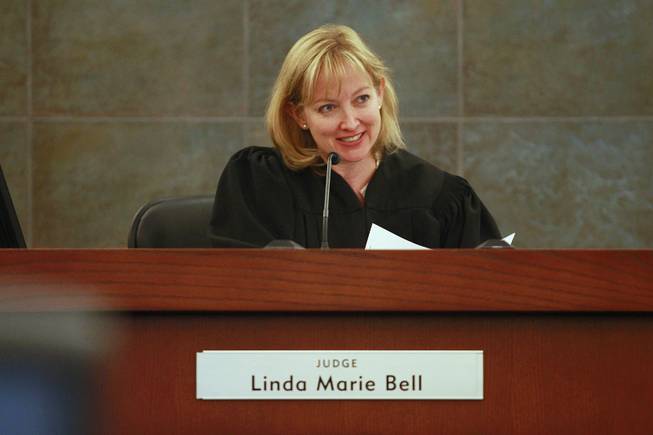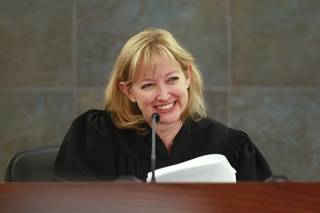Wednesday, Aug. 15, 2012 | 2 a.m.
The numbers came easy for most. Others had to pause and think for a minute.
Then they answered with a hint of triumph:
“15 months, three days.”
“Four months, four days.”
“20 days.”
Their answers elicited applause Tuesday afternoon from fellow participants in drug court, a specialty court program within Clark County District Court. The numbers correspond with how long each person has been sober or clean.
From her bench, Judge Linda Bell offered a wide smile and heartfelt “Good for you.” She doesn’t know the participants well, but give her a few months. Last week, Bell took over as the specialty court judge, a position vacated by Judge Kathleen Delaney, who recently finished a one-year commitment in the role.
Bell said she would preside over adult felony drug court, felony DUI court, prison re-entry drug court, veterans court and mental health court — special programs that aim to help defendants overcome issues or treat illnesses to keep them out of future trouble.
At the beginning of drug court Tuesday afternoon, Bell climbed down from her bench and shook 35-year-old Jaime Shelford’s hand. It was graduation day for Shelford, who began the program July 18, 2011.
“Jaime, I understand you have been such a strong person throughout this program,” Bell said, congratulating her and presenting her with a certificate of successful completion.
Shelford, a former methamphetamine addict, now works as a house manager at a sober-living community for mothers and their children. She lives there with her three children and says her life is dramatically different.
“I stayed focused and I went to my meetings,” Shelford told Bell.
Bell hopes to see many more happy endings. There are currently about 900 people enrolled in drug court, DUI court and mental health court, she said.
Her new role isn’t all that different from the career path she envisioned as a child — a veterinarian. Instead of healing animals, she now helps steer troubled people in the right direction.
The Sun recently sat down with Bell, who previously presided over civil and criminal cases, to discuss her new role and vision for the specialty courts. The following Q-and-A is a sampling from that interview.
How does your background suit you for presiding over Clark County’s specialty courts?
I was a public defender for 12 years before I was a judge, so I have a lot of experience dealing with the population of folks who are the participants in the specialty court programs, which I think is very helpful. Also, my undergraduate degree is in psychology.
What can the community expect to see stay the same or change under your leadership?
My first priority is to change how we handle veterans court. Right now, it is a part of our drug court program. We have a special calendar dedicated to veterans (in that program). But my plan is to have, starting in September, a separate veterans court calendar that handles all vet issues. We have a lot of veterans who have provided admirable service to our country who suffer from substance-abuse problems or mental-health problems as a result of their service and then come into contact with the criminal justice system.
How will the creation of a standalone veterans court help them?
The veteran population is supposed to do much better when they’re together. They can provide support and insight that other groups don’t have. I think it will also help us marshal resources a little bit better. There are so many wonderful programs in our community that provide assistance to veterans, so if we are able to concentrate the veterans in one place, then we’ll be able to better connect them with the services available.
Are there any other changes on the horizon?
One of the other things I want to do is to have more formal graduations because it’s such a big accomplishment to graduate from one of these programs. The shortest program we have is a year long, and the DUI court is three years long. In the beginning, the participants have to go to individual sessions and group sessions and support group meetings. There are a lot of requirements to get through the programs. They’re very intensive, and they require a lot of dedication and commitment.
Currently, we do graduations in court as part of the calendar. I would like to separate that out and make it a more special event for the participants and their families. I think we could do something that’s just a little more meaningful.
Why is that positive reinforcement so important for specialty court participants?
A lot of these people have never had an authority figure say, “You’re doing a good job.” That means a lot to the participants in the program. Their interaction with the courts has generally not been positive.
You can put somebody on probation and give them all these conditions. Some people do fine with that, but for other people, they need something a little more intensive — having that pressure to be accountable. I think that accountability and the positive reinforcement when they’re doing well makes a really big difference.
There always will be people in the community who either don’t understand or don’t see the need for specialty court programs. What would you like the community to know about the programs?
I live in this community. I have kids that go to school in this community. We all want to have a safe place to live, and I think the specialty court programs are something that work to help ensure that people are not committing crimes and not victimizing people in the community.
I think it is easy to look at specialty courts as something that is soft on crime, and I think it is important for people in the community to understand how strict the requirements are and how much work all the participants have to go through in order to graduate. It really helps with recidivism rates.
On a personal note, what excites you the most about your new role?
It’s nice to do something that is mostly positive because, as a judge, I make a lot of decisions that are difficult. We don’t see a lot of success stories. It’s nice to have the specialty court programs where you have the participants who come in and do well. That is a great thing.



Join the Discussion:
Check this out for a full explanation of our conversion to the LiveFyre commenting system and instructions on how to sign up for an account.
Full comments policy